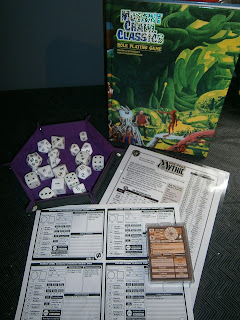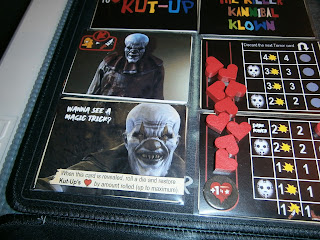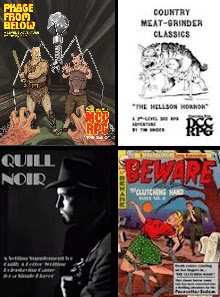This summer, I offered some advice on
how to plan and write a scenario you'll be running at game conventions. Now that you have your new player-killer in hand and folks are starting to gather at the table, let's talk about some advice on how to run it.
1. Provide pregens, and have more of them than your players. At a convention game, you have 4 hours - tops - to run the entire scenario. If you think you'll have everyone rolling up new characters before getting started, think again. Even if everyone at the table is familiar with the system, it'll likely take them 30 minutes to roll stats, look up skills/magic spells, decide on equipment, etc. And if you have a few players who are first-timers, that will add even more downtime. Steer clear of anything that would take away adventuring time and have pregens ready for folks before they sit down. And as an addendum: the players will still like to have some degree of choice as to who/what they'll be playing, so have twice the number of pregens available. If you have 6 players, have 12 (or more) pregens available so everyone has a chance to pick and choose rather than getting locked into "whatever character's left".
2. Bring extra pencils and dice. But keep rulebooks minimal. Although most players who come to your table are super-prepared, there may be someone who signed up at the last minute and/or showed up with a friend who now wants to play in your cool-looking game. Make sure you have some extra pencils and dice for this late-comer so they're not trying to borrow off of the other players at the table. But conversely, try to keep rulebooks and other tomes away from your table during play. The GM should be the only one who needs to look anything up (and honestly, you shouldn't have to look anything up if you're duly prepared). There may be some table or bit of minutiae to clarify, but you should be prepared to make rulings on the fly rather than get bogged down trying to find Table 3.24 on page 232 just to look up appropriate Exit Wound Size. (And don't let any player bring out a rulebook to debate a ruling you just made. Shut that down ASAP.)
3. Keep track of time. You have 4 hours to run the game, and you don't want to run out of time before finishing, nor do you want to reach the end way ahead of schedule. So keep an eye on the clock while you play. You can use a watch or a timer on your phone. I prefer to use a kitchen timer behind my screen so that I know how much time I have left at a glance. I can use this to gauge my timing of events as we play to ensure we reach the endgame before time runs out. At the 2-hour mark, we should be halfway through the adventure. If not, I start altering future scenes to speed things up (lowering the number of monsters and/or goons or bypassing entire scenes if they don't contribute to the overall scenario). If we're running fast, do the opposite and add a few extra monsters/scenes to slow them down. You also want to try to finish a few minutes early so you can say your goodbyes, thank you players, and clean up the table for the next game. Nothing more frustrating than waiting for folks to clear out from a game that ran long and is now starting to eat into your time. So don't be that person and wrap up on time or earlier.
4. Protect your voice by staying hydrated and have some lozenges. You're gonna be talking a lot. And your voice is gonna be a bit hoarse after that first game. But you have another one to run later that day. And the next day. And the next day. And if you're in a crowded gaming hall, you might be shouting over the din. You'll want to protect your voice as best you can. My suggestion is to have a bottle of water behind the screen and sip from it every so often, even if you're not thirsty. Keep those pipes moist to counterbalance all of the air you're throwing over them. Secondly, I have a pack of sore throat lozenges at hand that I'm constantly munching on. This helps soothe your throat before it gets too sore. I've found that a lozenge every hour or so during gametime keeps you from losing your voice before the convention ends.
5. If you must take a break, have only one, and keep it 5 minutes max. Four hours is a long time at the table, especially if everyone is chugging water, energy drinks, etc. Although folks will often be engaged and will want to keep playing, it's usually a good idea to stop at least once at the halfway point to allow folks to run to the bathroom and/or stretch their legs a bit. However, you don't want to lose too much game time and you certainly don't want to play sheepherder and try to round them all up, so set a firm time limit of 5 minutes on any breaks. After 5 minutes, pick up where you left off regardless of who's back, and have the stragglers join the game in progress. (And do not, under any circumstances, let anyone race to the vendor's room to "pick something up". Nine times out of ten, they'll never return to the game.)
6. Have some swag or takeaway for the players. It's always a nice gesture to have something to give to the folks who decided to take a chance on your game. Some game companies, like Goodman Games, provide swag for those who run their games. Stickers, note pads, quickstart rules, pencils, dice, etc. remind folks of the fun they had and may prompt them to buy the game and run sessions of their own. I admittedly go a bit overboard with my swag and have had custom dice, supplements, and other giveaways printed up for folks. One year I gave away mini-multitools like the ones found within the scenario I ran. (And this year's convention swag is a very special "parting gift" from one of my NPCs!) You don't need to have anything this fancy; heck, a bowl of candy on the table as you play is a
nice gesture for gamers to refuel as they head to their next game.
Stay tuned for "Part 3: Tips and Tricks for Surviving Your First Game Convention" in a future missive from The Savage AfterWorld!




































































































